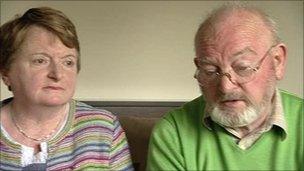Cloyne report: the victims' stories
- Published

Nuala and Jack O'Donnell
A report into how allegations of sexual abuse of children were handled in a County Cork diocese under the watch of Newry-born Bishop John Magee has been published.
BBC reporter Julie Kirby has been speaking to families caught up in the story.
Sixteen years ago Maeve O'Donnell told her parents she had been abused by a priest.
She said she was worried he had started to abuse another girl and she wanted to warn others what was happening.
Maeve and her parents went to Cobh in County Cork to where the-then Bishop John Magee lived.
Maeve died four years ago from an infection following an operation.
Her father Jack explained what happened when they went to see Bishop Magee.
"The first thing he asked us was were we looking for money, and we said no," he said.
"And our daughter mentioned the fact that she believed he (her abuser) was continuing to abuse others. Bishop Magee had a quick word with our daughter in private.
"He said he believed her and he'd look after things and we left happy".
But nothing was done.
The O'Donnell's went to the bishop's house again. Eventually, after a number of months, the bishop's child protection designate monsignor Dennis O'Callaghan told them their daughter's abuser had been cured.
"Dennis O'Callaghan said he'd sent the priest away for counselling and he was fine now, he was back in ministry and he was fine. Two or three weeks of a recovery seemed amazing to me," Mr O'Donnell said.
'Vulnerable young people'
This type of failure to respond adequately or appropriately to allegations of child sexual abuse was first brought to public attention in December 2008 when a report by the Catholic church's own child protection watchdog was published.
The National Board for Safeguarding Children (NBSC), external examined the handling of complaints by five people against two priests.
It found that Bishop Magee's diocese "failed to act effectively to limit the access to children by individuals against whom credible allegations of child sexual abuse had been made".
The board's report stated this failure potentially exposed "vulnerable young people to further harm".
In January 2009, the government asked the Commission for Investigation, which had been looking into abuse cases in the Dublin Archdiocese, to examine what was happening in Cloyne.
Maeve Lewis from support group, One in Four, says that while the Cloyne report may duplicate some of the findings of the Dublin abuse report which covered a period from 1975 to 2004, this report goes up to 2009.
She said: "It will show us what happened in the first decade of the 21st century in a diocese which had signed up to new procedures and protocols in child protection in the Catholic church."
'Touched by the devil'
Protocols which were in place when a woman, who spoke on condition of anonymity, came forward in 2005. She was physically abused for years from the age of 12.
The woman said: "The first of everything for me at such a young age was this devil. It literally feels like being contaminated by a horrible disease. I feel I've been touched by the devil and that is something that nobody will ever fix for me you know."
It took decades before the victim was able to tell anyone of the abuse she had suffered.
In 2005 she spoke to an Archbishop who told her that Cloyne was a great example of child protection procedures; that the diocese "could be held up as a great example to the rest of the country".
Meanwhile the report she had made to Irish police had been sent to the director of public prosecutions but her case was not pursued.
With no justice from the courts, she feels betrayed by the church and state.
"As far as I'm concerned the state of the church right now is corrupt, evil, rotten, it is a diseased organisation and the state is exactly the same…they know exactly how to play it," the victim added.
"This report will come out and there'll be noise and pandemonium for a few days and there'll be shock and upset and then it'll all just go away again."
'Quite damning'
In 2006, legislation was introduced in the Republic which made it a criminal offence to recklessly endanger children.
Ms Lewis said the publication of the Cloyne report will make uncomfortable reading for Bishop Magee.
"I think John Magee will be under the spotlight in a way that's going to be quite damning," she said.
"He has since resigned but I think he will forever be associated with the diocese of Cloyne."
For those directly affected it will be a difficult period.
Jack O'Donnell said it is tough for the victims, but also for their parents and siblings who have "been through hell".